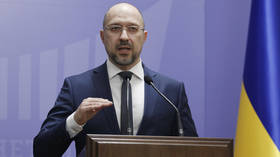Wrong button? 10 MEPs who voted to reject debate on Article 13 say they didn't mean to
A vote to consider amendments to the controversial Article 11 and Article 13 copyright laws has failed in the European Parliament by a margin of five votes. However, enough MEPs to flip the result now say they mis-clicked.
A total of 13 MEPs have issued corrections to their voting on Tuesday, when the European Parliament narrowly rejected debating amendments that might have watered down or even completely erased Articles 11 and 13 from the updated EU copyright rules.
Also on rt.com 'Dark day for internet freedom': EU lawmakers approve controversial copyright reformInstead, the lawmakers voted to bypass additional debate on the highly contentious provisions by 317 votes against 312, and proceeded to pass the entire legislation by 348 votes to 274.
According to European Parliament voting guidelines, MPs can register corrections to their votes, but without changing the actual result, which is done and dusted once the voting is finished.
Marietje Schaake, MEP from the Alliance of Liberals and Democrats for Europe Party, drew attention to the fateful mistake on Twitter as soon as corrections were published by the European Parliament.
A total of 13 MEPs said that they did not intend to vote the way they did. Of these, 10 said they wanted to vote for amendments, but instead voted against them; while two MEPs had it the other way around. One MEP claimed that he wanted to abstain from the vote altogether.
Schaake noted that the new count would have allowed the debate to be reopened which, potentially, could have paved the way for Articles 11 and 13 to be revised or repealed.
"History is a dime on its side," she wrote.
A very inconvenient truth about the #copyright vote: after corrections of votes (allowed for the record but without changing the outcome of the vote) there would have been a majority for voting for or against 11&13. History is a dime on its side ↘️ (P. 51) https://t.co/S1DhXBcqAo
— Marietje Schaake (@MarietjeSchaake) March 26, 2019
No, people ‘mis-voted’ on whether or not to allow for votes to remove 11 & 13. Votes which then did not take place, but after all corrected votes are included, the numbers/record have changed (while not changing the outcome) https://t.co/fKbKIGnVXP
— Marietje Schaake (@MarietjeSchaake) March 26, 2019
Earlier, the Sweden Democrats party, whose two MEPs were among those who mistakenly voted against the amendments, issued a statement saying that they had pushed the wrong buttons. The party said its MEPs were confused by the change of vote order during the session.
"Today we had three push-button votes on the Copyright Directive. On one of the votes, we pressed the wrong button: the vote on the order in which we would vote. If it had gone through we could've voted on deleting Article 13, which we wanted," the party said in a statement.
However, some found it hard to believe that so many MEPs were careless during a vote that had even the most apolitical denizens of the internet glued to the European Parliament proceedings. They suggested the MEPs wanted to escape backlash by claiming they would have voted for more scrutiny.
I am not as certain as you are. I fully expect some MEPs to vote the way that they really wanted, just to later change the records to the other choice - to be able to say that they did wrong but later changed it, as a way to get away with how they voted.
— Magnus Andersson Ⓟ (@Moinois) March 26, 2019
The new legislation has been met with cheers from big publishers and record labels, and dismay from the rest of the internet, with many fearing it will kill creative freedom with big tech like Facebook, YouTube and Twitter being forced to block content that might infringe on copyright. It has been suggested that online platforms can embed filters that would automatically analyze the content being uploaded, compare it to a database of copyrighted works, and stop it from being released if found in violation of copyright law.
Article 11 of the law known as the "link tax" requires a blogger, a news aggregator or a media-monitoring website to seek permission from the copyright owner to share links and snippets of its content.
However, for many netizens the most nefarious part of the directive is that it could have outlawed memes and GIFs, previously protected under a parody clause. Many breathed a sigh of relief when the European Parliament noted that sharing memes and GIFs would be "specifically excluded" from its scope, but others remain skeptical about an automated filter's ability to tell parody from copyright infringement.
Think your friends would be interested? Share this story!















